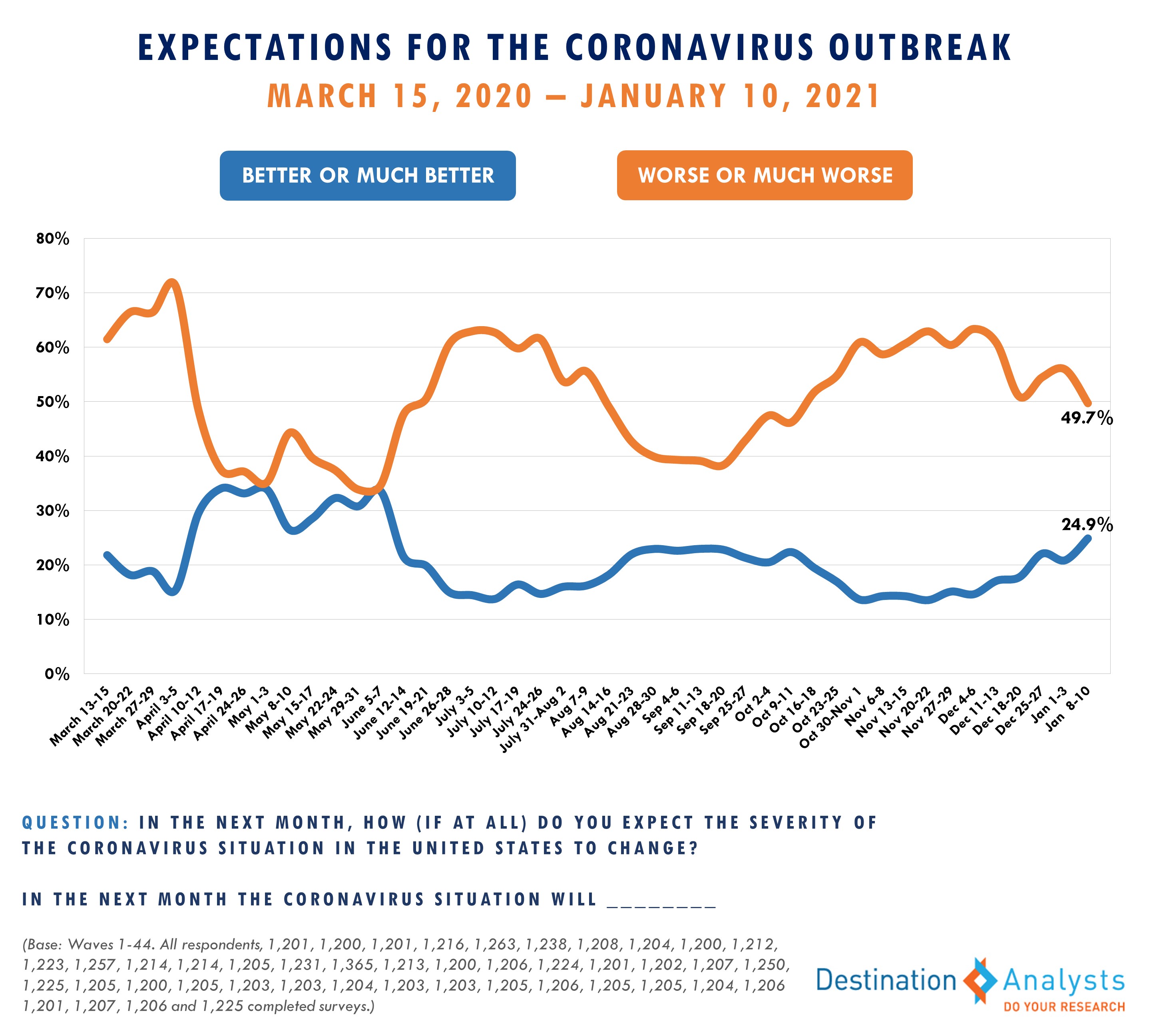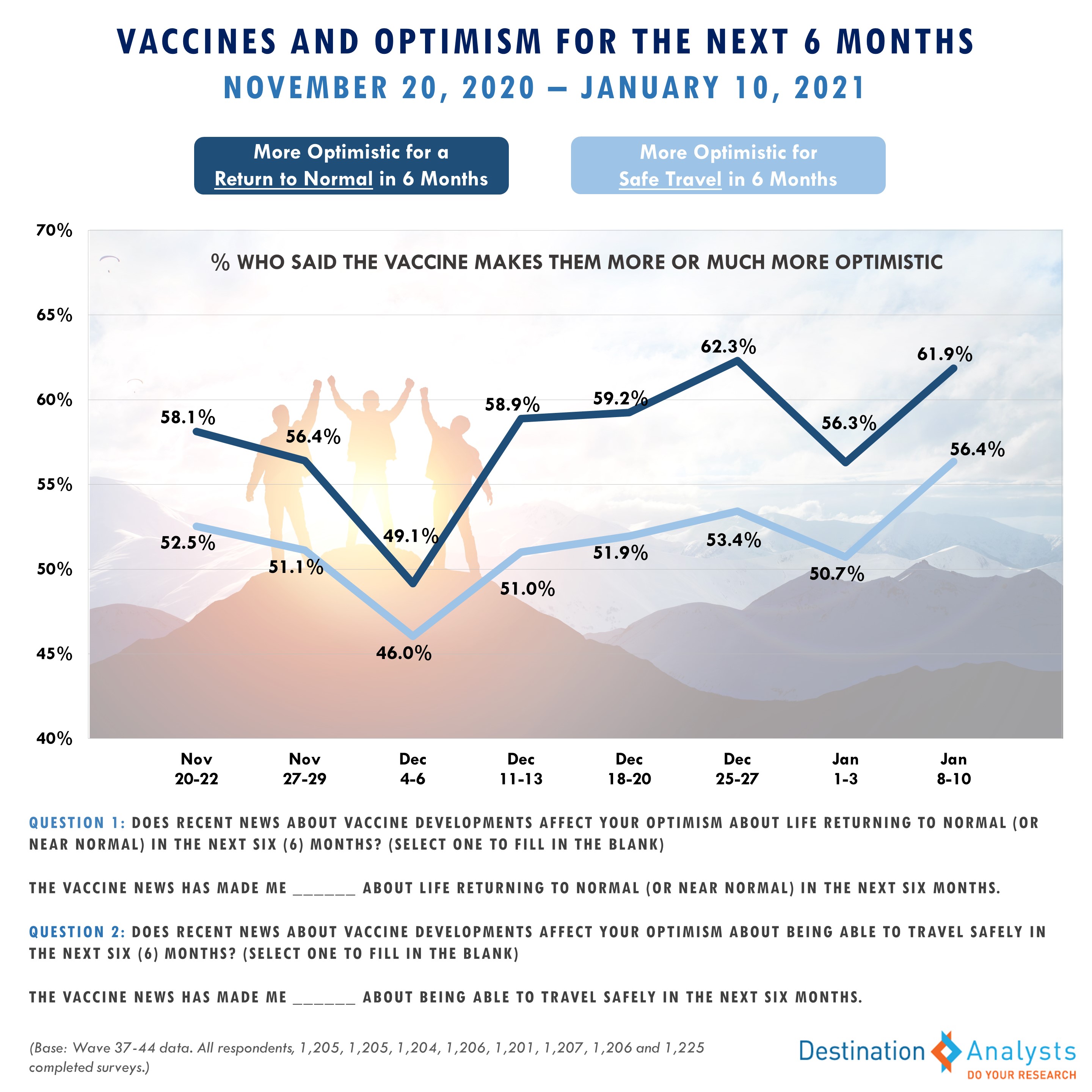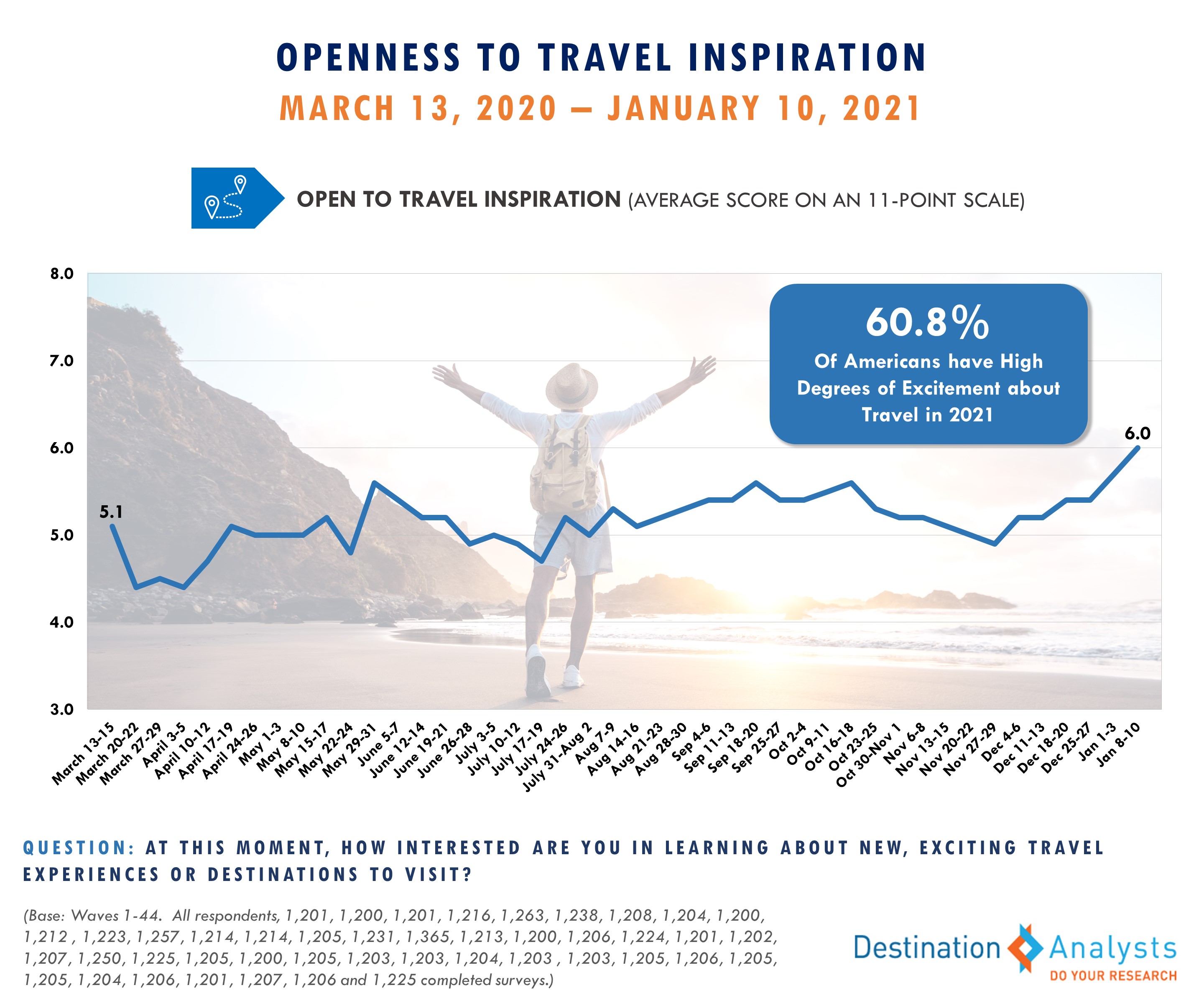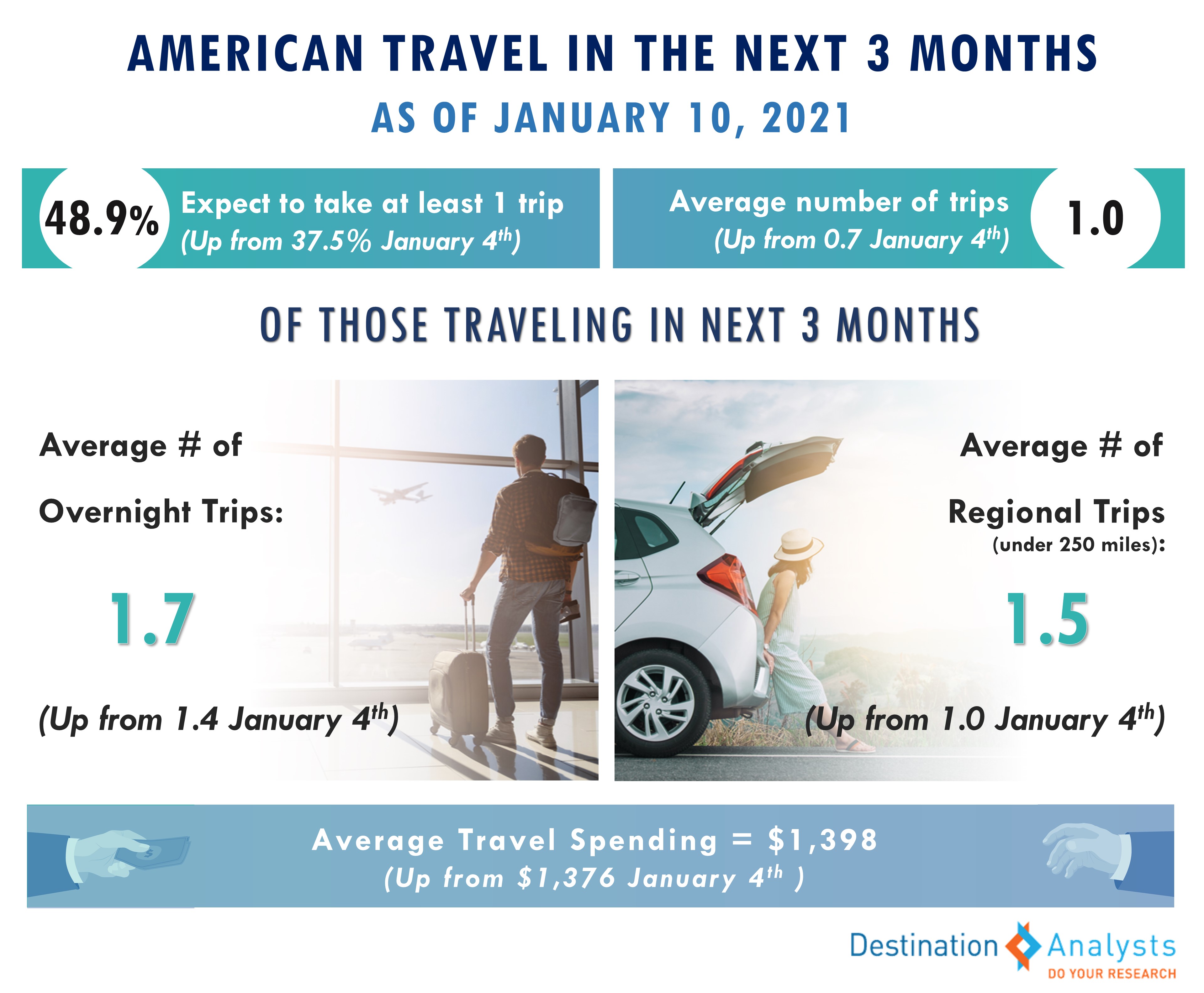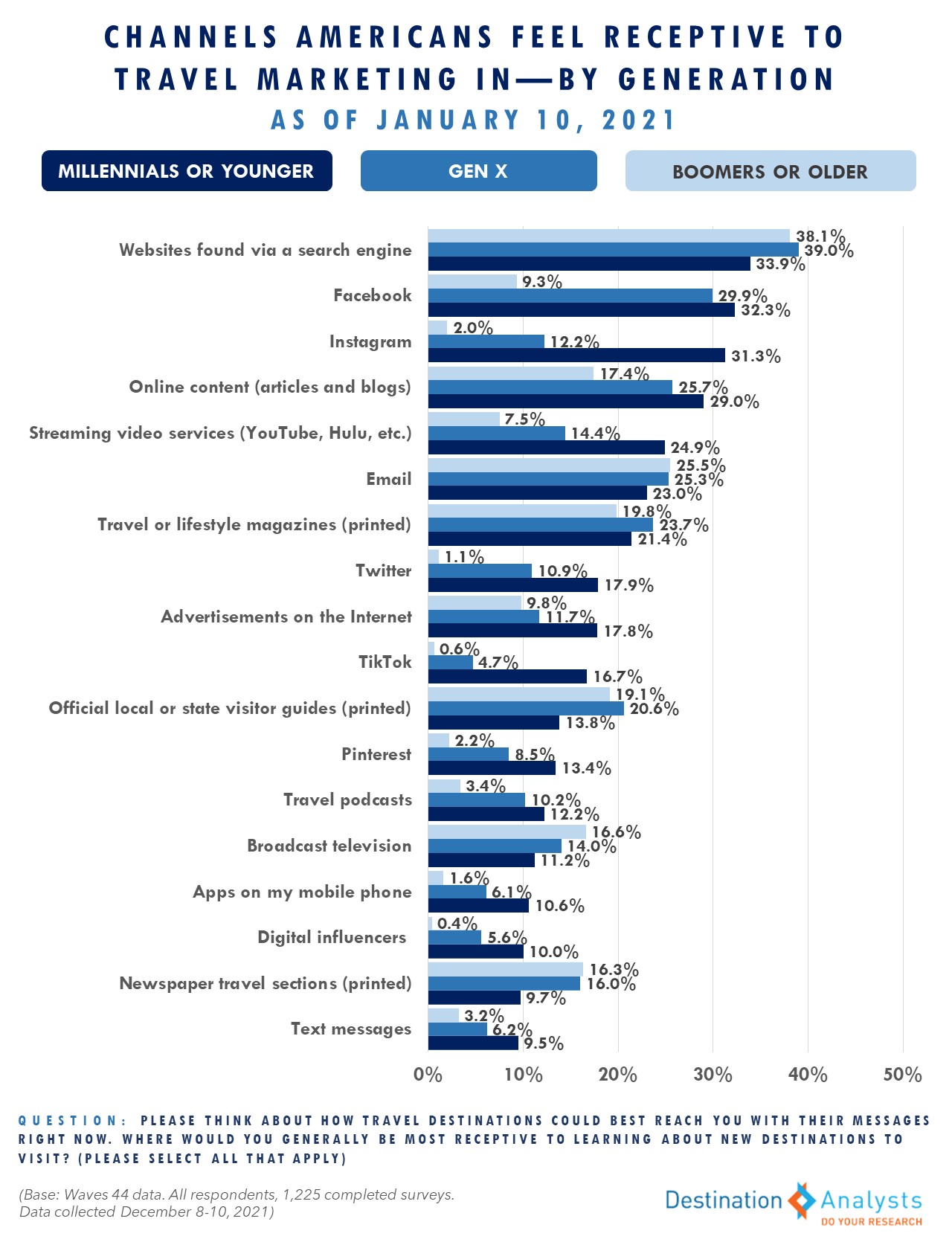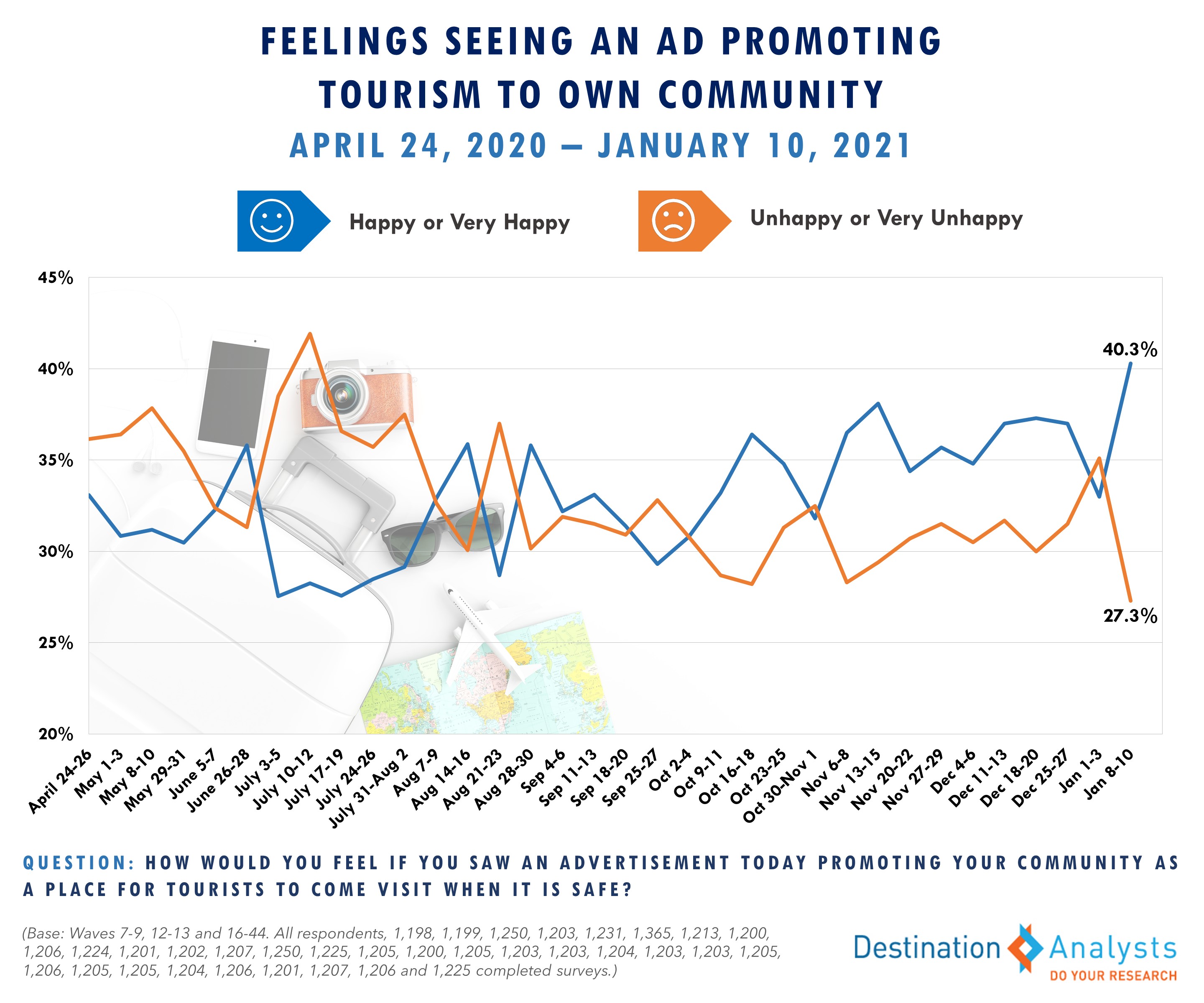Update on American Travel in the Period of Coronavirus—Week of January 11th
Anxieties may be raised, but as Americans look out over the next month, they see an improving situation. For the travel industry, this means a delightful shift in sentiment towards travel, with openness to travel inspiration never higher in the last 10 months.
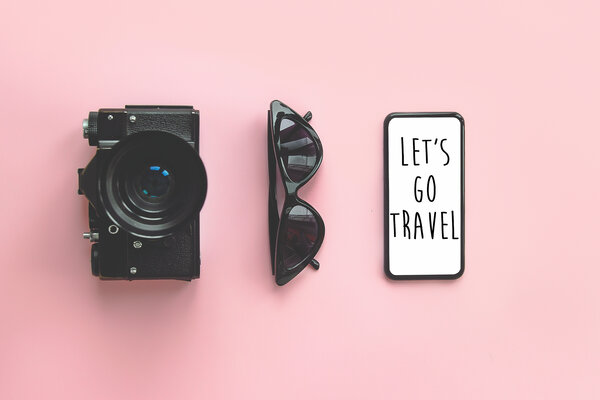
IMPORTANT: These findings are brought to you from our independent research, which is not sponsored, conducted or influenced by any advertising or marketing agency. Every week since March 15th, Destination Analysts has surveyed 1,200+ American travelers about their thoughts, feelings, perceptions and behaviors surrounding travel in the wake of the coronavirus pandemic, and explored a variety of topics. The findings presented below represent data collected January 8th-10th.
Key Findings to Know:
- Across the country, anxiety was up this week, particularly about personally contracting COVID-19 and the pandemic’s impact on the national economy. But as Americans look out over the next month they see an improving situation.
- Undoubtedly, the availability and ongoing distribution of COVID-19 vaccines are a contributor to these feelings of encouragement. The proportion of American travelers who say the vaccines make them more optimistic about life returning to normal in the next six months (61.9%), the proportion who say the vaccines make them more optimistic about being able to safely travel in the next six months (56.4%), and the number of travelers saying they have begun planning and booking trips specifically in anticipation of vaccines being available (33.7%) have all risen.
- Amongst the most critical indicators of Americans’ path to a travel norm is the plummet in perceptions of travel activities as unsafe. This week, an average of 50.1% perceive the travel and leisure activities we track as unsafe, which is the lowest it has been since March 15th. More Americans are confident they can travel safely now, rising to 31.8% from 24.7% last week.
- Americans’ openness to travel inspiration reached a pandemic-period peak, measuring 6.0 on a scale of 0-10. Those in a travel readiness state-of-mind soared nearly 12 percentage points to 58.6%, also the highest it has been in the pandemic. Excitement levels about travel in 2021 grew to 6.1 from 5.8 last week.
- As Americans plan their travel for 2021, July is still the peak month, with 27% saying they have at least tentative plans to travel then. Right now, 31.4% of American travelers anticipate their next air trip to be in the first half of the year.
- When it comes to travel in the next three months, more Americans are seeing this as a reality. This week, 48.9% say they will take at least one leisure trip in the next 12 weeks, up from 37.5%. Of those Americans who will travel, they anticipate 1.7 overnight trips on average, largely within 250-miles of where they live.
- 43.0% of all American travelers say discounts and price cuts can motivate them to take a trip they had not previously considered—a 43-week high.
- With the important increase in Americans’ desire for travel inspiration, content found through search engines, email and travel/lifestyle magazines are good bets for travel marketers across generations, while streaming video services and social media are also key for inspiring younger travelers.
- While 53.5% still do not want visitors to their communities right now, a high of 40.3% said they would be happy if they saw an advertisement promoting their community as a place for tourists to come visit when it is safe.
Across the country, anxiety was up this week, particularly about personally contracting COVID-19 (72.5% highly concerned) and the pandemic’s impact on the national economy (85.1% highly concerned). But as Americans look out over the next month, they see an improving situation—the percent of Americans who feel the pandemic will get worse in the U.S. in the next month dropped below 50% for the first time since the week of October 12th, and the percent who feel things will get better rose to 24.9%, the highest it has been in 7 months, since the week of June 8th. For the travel industry, this resulted in a delightful shift in positive sentiment towards travel.
Undoubtedly, the availability and ongoing distribution of COVID-19 vaccines are a contributor to these feelings of encouragement. A high of 67.8% of American travelers believe the COVID-19 vaccines are safe. Last week, more American travelers than ever said they would be getting vaccinated against the virus, and this week that figure rose again to 61.4%. The percent of those with school-age children who say they will inoculate their kids increased to 53.2%, after being below half for the last 6 weeks. Most American travelers who will take a COVID-19 vaccine believe they will get their doses in the first half of this year. In terms of how this impacts their travel, while 48.7% still say they will engage in some travel avoidance until vaccines are widely available, there was a 5 percentage point rise in the proportion of American travelers who say the vaccines make them more optimistic about life returning to normal in the next six months, which is now at 61.9%. There was a similar increase in the proportion of American travelers who say the vaccines make them more optimistic about being able to safely travel in the next six months, as well as a rise in the number of travelers saying they have begun planning and booking trips specifically in anticipation of vaccines being available—now at 33.7%.
Amongst the most critical indicators of Americans’ path to a travel norm is the plummet in perceptions of travel activities as unsafe. This week, an average of 50.1% perceive the travel and leisure activities we track as unsafe, which is within 0.9% of where this metric was March 15th and the lowest it has been since that date. More Americans are confident they can travel safely now, rising to 31.8% from 24.7% last week. Loss of interest in travel for the time being declined to 42.5%, down from a high of 49.5% one month ago. Those whose normal travel patterns were disrupted by the pandemic are now missing travel even more, with nearly two-thirds saying they miss traveling “very much.” Americans’ openness to travel inspiration reached a pandemic-period peak, measuring 6.0 on a scale of 0-10. Those in a travel readiness state-of-mind soared nearly 12 percentage points to 58.6%, also the highest it has been in the pandemic. Excitement levels about travel in 2021 grew to 6.1 from 5.8 last week.
As Americans plan their travel for 2021, July is still the peak month, with 27% saying they have at least tentative plans to travel then. Right now, 31.4% of American travelers anticipate their next air trip to be in the first half of the year. The traumatic events of last week may have disrupted the amount of time devoted to travel dreaming (there was a small decline in those that said they had day-dreamed about travel in the last week), although twice as many report having actually made travel reservations last week than the week prior (15.9% up from 8.0%). When it comes to travel in the next three months, more Americans are seeing this as a reality. This week, 48.9% say they will take at least one leisure trip in the next 12-weeks, up from 37.5%. Of those Americans who will travel, they anticipate 1.7 overnight trips on average, largely within 250-miles of where they live. Although the average anticipated spending on travel in this period has increased to $1,398, 50.5% report they will be more budget conscious. In fact, 43.0% of all American travelers say discounts and price cuts can motivate them to take a trip they had not previously considered—a 43-week high.
With the important increase in Americans’ desire for travel inspiration, travel marketers will be keen to reach them. This week, we asked American travelers which channels they were most receptive to learning about destinations to visit. While online content found through search engines, email and travel/lifestyle magazines are good bets across generations, streaming video services and social media are key for inspiring younger travelers.
It’s also essential to track how Americans are feeling about travel to and within their own communities. This week, 43.8% feel comfortable going out for leisure in their own community, the highest this has been in 2 months. While 53.5% still do not want visitors to their communities right now, the percent that that said they would be happy if they saw an advertisement promoting their community as a place for tourists to come visit when it is safe hit 40.3%–another metric to hit a pandemic-period high this week.

